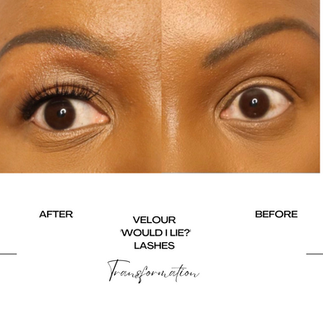Self-love tips for alopecia
- Joy Blenman

- Oct 3, 2022
- 3 min read

Note: This post is sponsored by Velour Beauty. This month they are donating a percentage of their sales to the Canadian Alopecia Areata Foundation in honour of Alopecia Awareness Month.
Living with alopecia means learning to love a new or different version of yourself, day after day. What does it look like to love yourself even if you don't recognize the person in the mirror? What does it look like to love yourself even when your hair is thin or patchy? And what does it look like to love yourself even after your eyebrows have fallen out?
There are no easy answers to these questions that I've grappled with over the years, but the tips outlined below have helped me move closer to a place of self-love.
Here are some of the self-love lessons I've learned recently living with alopecia. Watch my video below for more insights on this topic.
Self-love and self-care tips for hair loss
1. Remember: You have options to explore your beauty in a unique way.
I feel like this is the essence of Beyonce's new single, 'Alien Superstar,' you are UNIQUE. You are one of one, so find ways to celebrate your unique intricacies.
Take the time to experiment with:
Makeup
Different wig colors and textures
Hats and headwraps
Flattering fashion that makes you feel confident
There are a lot of great brands for false lashes, brows and wigs that can help you feel like your natural self again. Knowing that I have these tools has been a game-changer for me. Take a look at the pics below to see how adding a lash can really open up your eyes and elevate your look. I’ve selected a few of my fav Velour lash styles below, Second Nature from the Plant Fibre Collection and Would I Lie? from the Effortless Collection (Use code Joy20 at checkout to save).
Tip: It takes time to find your style, so don't be afraid to explore new brands, styles or looks until you find what feels like YOU.
2. Find people who speak your language
Hair loss can be very isolating, even if you have supportive friends and family, because it is hard for people to understand the profound pain of hair loss unless they've gone through it. While educating your close circle about how they can best support you is essential, finding community with others living with alopecia is just as critical.
The good news is the alopecia community is super supportive, knowledgeable, and compassionate. I wish I had sought out connecting with others with alopecia earlier!
Here are some alopecia support groups, charities, and platforms to check out:
CANAAF in Canada: I've done workshops with this organization, and they offer support for alopecians of all ages, including kids, teens, and parents of people with alopecia. They have annual conferences where you can connect with other alopecians, learn about the science behind alopecia and discover wig vendors. This year Velour will donate a % of their September proceeds to the organization.
NAAF: This is the American Alopecia Areata Foundation of America. They offer support groups, resources, and medical information.
The Instagram alopecia community, like my platform Joyful Beauty, is also incredibly supportive. I have met so many great alopecia sisters through IG.

3. Don’t be afraid to get professional help!
I encourage you to do your research and get professional help with whatever you need support with—whether that is getting support with installing wigs, doing your makeup, or processing emotions. These are big new things you are tackling, so it is okay to ask for help!
Getting expert help from a wig maker and hair stylist helped my wigs look more realistic and taught me a lot about managing wigs at home. Another helpful thing was getting professional assistance with my brows from an esthetician who does semi-permanent makeup. (If you're in TO, definitely check out my esthetician). Most importantly, getting support to navigate hair loss's emotional effects is vital, so take the time to speak with a mental health professional and/or your doctor. You can learn more about the psychological effects of hair loss in this article I wrote for Sun Life Financial, the Canadian insurance provider.
4. Give yourself the gift of time.
It takes time to heal and grieve your hair loss, so don't try to beat yourself up for feeling insecure or having a bad day after making progress because progress is not linear. Also, don't try to compare yourself to someone else's timeline. Your journey is unique and will unfold according to your needs.

Living with alopecia means redefining your beauty on your terms. Here's to learning to feel like yourself again after losing your hair, lashes, or brows. Here's to unlearning the definitions of beauty that have been forced on you. Here's to loving you and all of the versions of you to come.













Comments